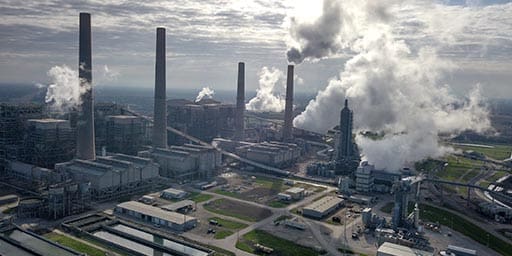Advancing Climate Justice
The scientific community has issued increasingly dire forecasts of global greenhouse gas emissions. Without a just response to the escalating climate crisis, environmental justice communities will continue to bear the brunt of the worsening impacts on health and wellbeing while, in the meantime, continuing to breathe in toxic air.

What We're Doing
We work with communities and allies toward a just transition to a decarbonized, fossil-fuel-free future. We call for the cutting down of CO2 emissions that fuel climate change-induced inequities and advocate to ensure those affected are part of the conversations around the solutions.
Beyond Carbon: WA Parish Power Plant
We work alongside the community via grassroots organizing against NRG Energy’s W.A. Parish coal-fired power plant in Fort Bend County – one of the state’s worst climate polluters. Our team of coordinators is surveying the community to gather testimony and provide education about the dangers of having this health-harming pollution in our own backyard. Our goal is to help shut down the W.A. Parish plant in order to advance our mission for clean air.
Decarbonization
New technologies and emissions reduction strategies have emerged to address the issue of carbon-driven climate change. We recognize that different strategies must be employed to achieve global climate goals. Our climate team is analyzing comprehensive decarbonization strategies and their impacts for the region including but not limited to technological responses such as Carbon Capture Utilization, and Storage (CCUS).
CCUS is a highly technical subject that only a handful of high-level interest groups (city, industry, and university cliques) are familiar with, often leaving those at risk out of the conversation. We want to involve environmental justice communities in these discussions and look critically at the role of CCUS in decarbonization strategies today, so that community remains at the center of a decarbonization future.
Local and regional climate action planning
We proudly supported the City of Houston in the creation of its first-ever Climate Action Plan (CAP). After co-leading the transportation working group for the CAP, we are now advocating for the codification of the plan and accelerated implementation of its strategies. Alongside City of Houston climate action planning, we are also supportive of Harris County’s movement towards a county-level plan. In addition, we are working with diverse partners to create new frameworks, legislative agendas, and plans for addressing the intersections of air quality, climate, equity, and energy.
Opposing chemical plastic recycling
The industry that produces plastic is claiming to have the solution to plastic waste: chemical recycling, or “advanced recycling,” a process that heats plastic with chemicals to break it down either into microplastics or into fuel, and, in the process, emitting tons of carbon and other toxics into the air, including carcinogens. Rather than reduce single-use plastics, the petrochemical industry is pushing these alternatives at the expense of public health. We are working with community members primarily in Baytown, Galena Park, and Pasadena, where these new plastic “recycling” or “sustainable” fuel facilities are located, to raise awareness of this false solution and to urge decision-makers to reject industrial air pollution.
Report: Close Parish Coal: How the Dirtiest Coal Plant in Texas Harms Public Health and the Environment; and the Alternatives for Fort Bend | Cierre de la Planta de carbón de Parish: Los perjuicios que la central de carbón más sucia de Texas cause en la salud publica y el medio ambiente y las alternativas para Fort Bend
Air Alliance Houston, July 2023
Report: Perspectives on Carbon Capture Technology in Houston: A Qualitative Assessment and a Path Forward | Perspectivas sobre la tecnología de capture de carbono en Houston: Evaluación cualitativa y possible camino hacia el futuro
Air Alliance Houston, June 2023
W.A. Parish Fact Sheet | Pagina informativa – W.A. Parish
Summary Sheet: What Houstonians Need to Know About Carbon Capture | Ficha resumen: Lo que los residentes de Houston deben saber sobre la captura de carbono
Chemical Recycling: A False Solution to the Plastic Crisis in Houston
